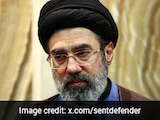- US President Trump criticised for authoritarian attacks on media since returning to office
- Trump accused of inspiring global press crackdowns, says Reporters Without Borders
- Trump used lawfare, economic pressure, and bans to limit press freedom in six months: Media watchdog
Media watchdog Reporters Without Borders on Thursday slammed US President Donald Trump for his "authoritarian" attacks on the media since returning to office, accusing him of inspiring press crackdowns worldwide.
Trump "has grown into a key figure in a global anti-journalism political movement," the New York-based RSF said in a statement.
In the six months since his return to the White House, RSF said Trump had used "lawfare" and economic pressure on newsrooms, dismantled public media, banned outlets and undesirable wording, as well as smearing journalists and their employers.
"Trump has matched years of verbally attacking journalists with new, concrete actions to limit press freedom. Many of these tactics are nothing new -- it's the same playbook we've seen press freedom predators employ around the world," said RSF USA executive director Clayton Weimers.
"But it's clear that Trump has amplified this phenomenon, emboldening and inspiring other leaders to crack down on their own domestic media. The result is a disaster for press freedom globally."
RSF also reported that it had tracked "at least 60 acts of violence against journalists during recent protests in Los Angeles against Trump's immigration policies."
"This aggression towards journalists has been a staple of Trumpist politics," RSF said.
In February, the White House restricted the access of US news agency Associated Press (AP) because it refused to use "Gulf of Mexico" instead of "Gulf of America," as the body of water was renamed by Trump.
The Trump administration is also seeking to dismantle public broadcasting and has announced the closure of international radios Voice of America, Radio Free Europe/Radio Liberty, and Radio Free Asia. His bid is facing legal challenges.
RSF said the measures would deprive hundreds of millions globally of "credible information," promoting "propaganda" media by "authoritarian regimes" like Russia and China.















